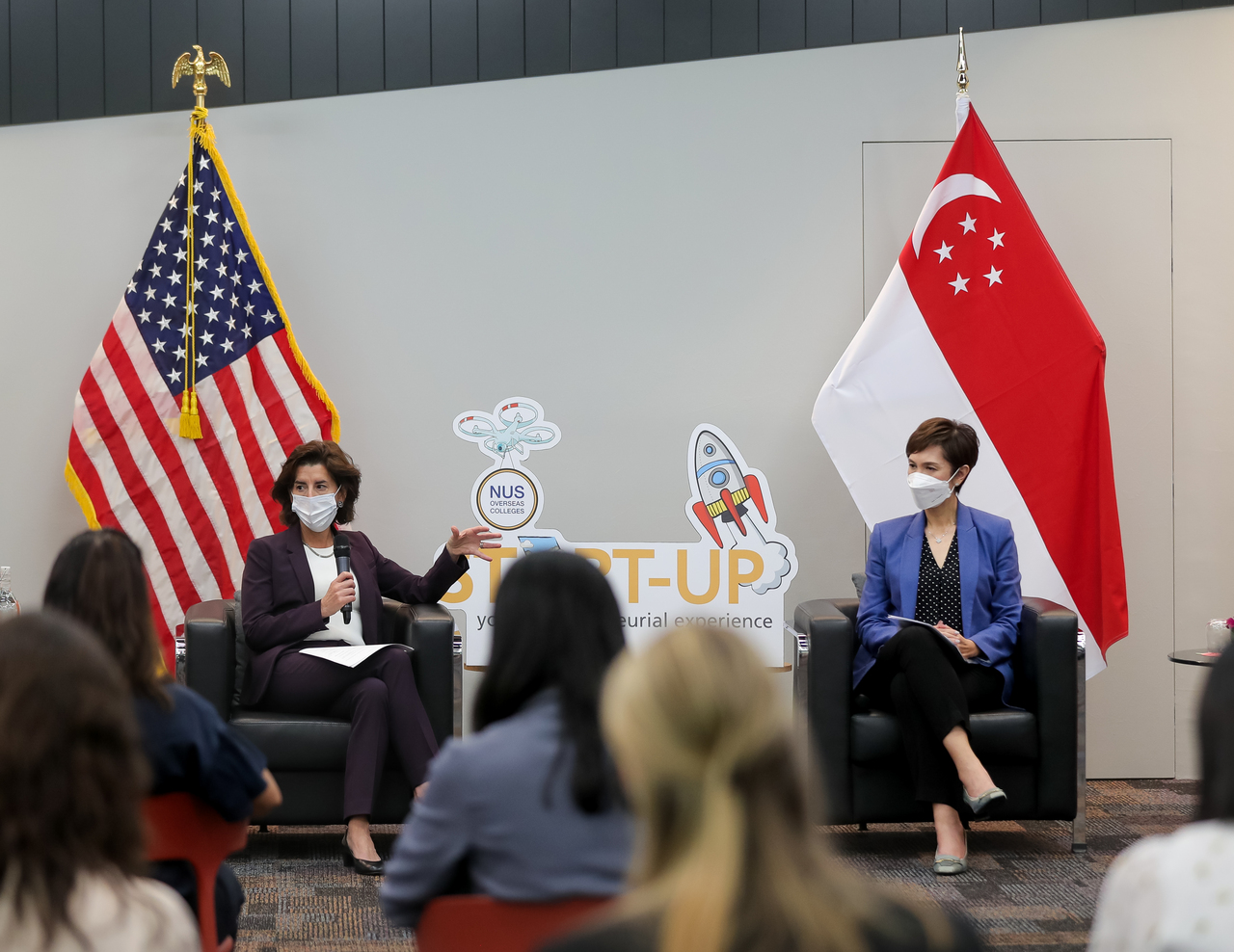Early exposure essential to draw more girls into science, tech careers: Panellists
Sign up now: Get ST's newsletters delivered to your inbox

US Secretary of Commerce Gina Raimondo and Minister for Communications and Information Josephine Teo at a panel discussion at the National University of Singapore.
ST PHOTO: GAVIN FOO
SINGAPORE - Girls must be exposed to science and technology early in their lives in order to make informed choices about their education and careers, said panellists at a dialogue session on Tuesday (Nov 16).
United States Secretary of Commerce Gina Raimondo, who is in Singapore on an official visit and was one of the speakers, cited an example from the US state of Rhode Island, where she had served as governor.
"We brought about the teaching of computer science in every public school in Rhode Island, starting when kids were in kindergarten, (at) five years old. And the result of that early training was astonishing.
"Once girls were exposed to computer science, naturally they took to it, they did incredibly well and more of them started to go into tech fields, simply because they were exposed to it," said Ms Raimondo.
She was speaking at a panel discussion at the National University of Singapore about getting more women into the tech sector. The event, titled Women in Tech - Seizing Opportunities in the Digital Economy, was co-hosted by the US Department of Commerce and Singapore's Ministry of Communications and Information.
Minister for Communications and Information Josephine Teo, who was also one of the speakers at the event, highlighted the importance of growing the pipeline for tech talent at an early age.
"We have to start very young. In our schools, for example, any child above the age of 10 has the opportunity to do coding for fun. And this is where they get to learn some of the core computational concepts," she said.
Compulsory coding enrichment classes have been conducted for all upper primary pupils since 2020, as part of efforts to expose children to basic coding.
"We hope that it provides a foundation so they don't feel alienated and can grasp the domain."
Social norms, too, tend to dictate what girls can and cannot do, and what they should and should not do, Mrs Teo said.
She added that as girls grow up, they must have the confidence to pursue subjects typically associated with boys, as well as careers in technology.
Ms Raimondo, who is in Singapore for two days from Nov 16, said that the world cannot afford for women not to be fully engaged in the workforce.
"Homogeneity is the enemy of innovation," she said. "If only one kind of person is innovating, doing start-ups, we will not be successful. In order to have the creativity of an entire population unleashed, everybody needs to be included, including women."
In Singapore, women make up 41 per cent of the tech workforce - well above the global average of 28 per cent.
At the panel discussion on Tuesday, three women entrepreneurs shared their insights about joining the tech field: Ms Lim Ee Ling, who heads business development for venture capital firm 500 Startups in Asia-Pacific, biotech start-up TurtleTree co-founder Lin Fengru, and Ms Tulika Raj, co-founder of green hydrogen start-up SunGreenH2.
Ms Lim had left her corporate job in the banking sector to start education platform Smarter Me, which equips children with skills such as coding and robotics.
It was her daughters who inspired her to make the switch.
"I looked at them going through school. Here I was in banking, working with a lot of tech founders raising funds, realising that the world has changed so much; but my girls were still not having the opportunities to go into robotics and entrepreneurship," she said. "And had no mentors to tell them that there are other opportunities out there, that they don't have to walk the same path as everyone."
Women must have the power to make choices of their own that are not shaped by social norms alone, said Ms Lim.
Mrs Teo said women might face challenges as a minority in the workplace.
"It does mean that your viewpoint is less likely to find resonance in the room. It does mean that sometimes, you'll have to project yourself a little more forcefully to be heard. And it does mean that because of your gender, you may be misconstrued as having other attributes that are not always very flattering. These things do happen," she said.
But society is changing and men are increasingly supportive, she added.
"I think most women would like to know that if they got a job, they got it on merit, not because someone gave them a concession. And the women who are put into positions of seniority, of leadership, most often live up to the expectations," said Mrs Teo.


